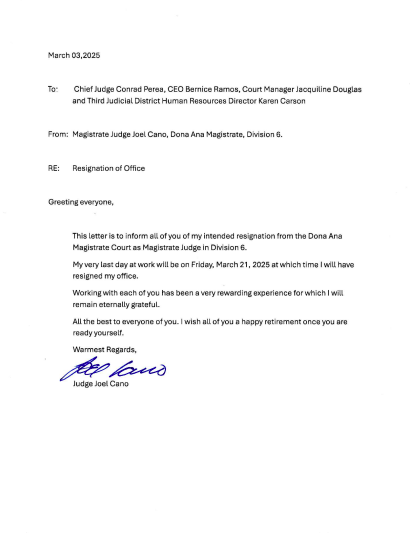A New Mexico magistrate judge has abruptly resigned following the arrest of an alleged member of the violent Venezuelan gang Tren de Aragua at his residence, raising serious questions about judicial integrity, law enforcement oversight, and the broader consequences of porous border policies.
Doña Ana County Magistrate Judge Joel Cano submitted his resignation on March 3, but authorities say they did not receive the formal letter until March 31. This nearly month-long delay between the written resignation and its official acknowledgment by the New Mexico Supreme Court and the 3rd Judicial District Court adds a layer of suspicion and bureaucratic opacity to a case that has already rattled public confidence.
The situation began to take shape in January when agents from Homeland Security Investigations (HSI) in Las Cruces began surveilling Cristhian Ortega-Lopez, a Venezuelan national who had illegally crossed into the United States in December 2023. Ortega-Lopez is accused of being a member of Tren de Aragua, one of the most brutal transnational gangs operating across Latin America, known for extortion, drug trafficking, and violent crime.
According to federal court documents, Ortega-Lopez was not only residing illegally but doing so in close proximity to firearms and in the company of other undocumented individuals. Alarmingly, the home where he was apprehended was connected to Judge Cano’s immediate family. Authorities executed two search warrants on February 28 at a residence identified as being owned by Cano’s wife, Nancy Cano, and occupied by their daughter, April Cano.
During the raid, federal agents seized four firearms and detained Ortega-Lopez and several others. Photographic evidence later surfaced showing Ortega-Lopez holding and firing weapons allegedly belonging to April Cano. He reportedly told investigators that April Cano allowed him to handle and shoot the firearms on multiple occasions.
Court documents further reveal that Ortega-Lopez first encountered the Cano family while working as a handyman. After being evicted from his apartment in El Paso, Nancy Cano allegedly offered him housing in a separate “casita” at the back of her residence. This act of generosity, whether well-intentioned or reckless, led to a dangerous entanglement between a sitting judge’s household and a man federal authorities now link to organized crime.
Perhaps more unsettling are the images filed as exhibits in the federal case. These include a Christmas photo from 2024 and scenes of Ortega-Lopez sharing meals with the Cano family—images that paint a picture of deep personal integration into the household. Such evidence raises serious concerns about whether Judge Cano and his family were knowingly or unknowingly harboring a criminal operative.
During a March 14 detention hearing, U.S. Magistrate Judge Damian L. Martinez questioned the relationship between Cano and Ortega-Lopez. When Assistant U.S. Attorney Maria Armijo said she did not know Cano personally, Judge Martinez responded, “I don’t think he would just let anybody live in his property,” suggesting a level of trust that may not be consistent with ignorance of Ortega-Lopez’s background.
Despite the serious allegations, Martinez determined that Ortega-Lopez did not pose a flight risk or a danger to the community, and he ordered the suspect’s release. This decision has sparked outrage among many who believe that criminal justice leniency toward illegal immigrants, especially those with alleged gang ties, is undermining public safety. A motion to reconsider the release order was filed by federal prosecutors on April 8.
Records from the Doña Ana County Assessor’s Office confirm that the home Ortega-Lopez was living in at the time of his arrest was jointly owned by Nancy and Joel Cano. The property’s legal ties to the judge himself further complicate the issue and could lead to disciplinary or even criminal scrutiny, depending on the outcome of ongoing investigations.
Joel Cano’s resignation letter, while brief, offered little explanation. Dated March 3 and stating his last day as March 21, it concluded simply: “All the best to every one of you. I wish all of you a happy retirement once you are ready yourself.” The understated tone of the letter does little to assuage public concern.
The entire incident has stoked concerns in conservative circles over the consequences of lax immigration enforcement and the apparent failure of some members of the judiciary to uphold the law with equal rigor. That a man allegedly affiliated with a foreign criminal enterprise was living under the roof of a sitting judge speaks volumes about systemic vulnerabilities.
In response, a spokesman for the New Mexico Administrative Office of the Courts confirmed that Democratic Governor Michelle Lujan Grisham would be responsible for appointing a replacement to serve the remainder of Cano’s unexpired term, which runs until the end of 2026. Meanwhile, the state Supreme Court has scheduled a public oral argument regarding Cano’s conduct for April 24, signaling that the matter remains far from resolved.
As Americans across the country express rising concern about public safety, judicial accountability, and border control, this incident in New Mexico stands as a stark reminder of what can happen when institutions fail to act decisively. While the courts continue to investigate, citizens are left to wonder how deep the connections between public officials and criminal elements may truly run.
In an era marked by growing demands for accountability and rule of law, the resignation of Judge Joel Cano may only be the beginning of a much larger story.

